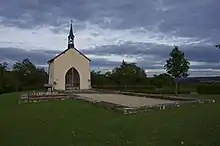
Trintange (Luxembourgish: Trënteng, German: Trintingen) is a small town in the commune of Waldbredimus, in south-eastern Luxembourg. As of 2005, the town has a population of 262. It is the administrative centre of Waldbredimus commune.
Church
After the French Concordat of 1801, in 1806 in the commune of Waldbredimus a second parish was established alongside the parish of Waldbredimus, with government salary, on the Stephansberg.[1] In 1808 the Stephansberg parish counted 284 souls.[1]
Through decree of 7 January 1827, the parish of the Stephansberg was dissolved, having never really taken form except on paper.[1][2]
By royal-grand ducal decree of 28 July 1851 and approval of the Apostolic Pro-Vicar of 4 August 1851, Trintange, Ersange and Roedt were once again carved off from the parish of Waldbredimus and given their own parish.[3]
History
Trintange was mentioned as one of the many localities that were pillaged and devastated under Louis XIV of France.[4] In 1680 under the orders of the French King, the Metz Chamber of Reunion demanded that the duchy of Luxembourg cede all territories that had belonged at any point to lands surrendered to France since 1648.[4] This was, essentially, the entire duchy with the exception of the capital and the few villages that were part of the priory of Luxembourg.[4] However, several villages that did belong to the priory and were not claimed by France, were also destroyed, around 33 localities including Trintange, Ersange and Roedt.[4]
Revolutionary Wars
Trintange's inhabitants were affected by the French Revolutionary Wars. In August 1792 the Prussian main army on their campaign against France set up their headquarters on the Moutfort plateau and plain and at Pleitranger Hof; they did the same during their later retreat.[5] In late 1792 and early 1793 the Austrian army had a field hospital in Ersange, possibly in connection with an army camp.[3] Several soldiers of the defeated army who died of the "foul fever" were buried near the hermitage chapel on the Stephansberg at Ersange.[5]
1946 plane crash
On the afternoon of 18 March 1946, four fighter planes appeared over Trintange.[6] These were Republic P-47 Thunderbolt fighters piloted by French forces stationed in occupied Germany.[6] While they were practising aerial combat, at one point two of them collided, and immediately crashed to the ground.[6] One of the planes crashed in the middle of the village, starting a fire.[6] The pilot bailed out but was not able to open his parachute due to the low altitude, and died.[6] The second plane crashed between Medingen and Dalheim, where it also exploded on impact.[6]
Footnotes
- 1 2 3 Blum, M.; Zieser, J.; König, A. (1 July 1929), "Series Pastorum", Ons Hémecht (in German), pp. 227–228, retrieved 24 October 2023
- ↑ Atten, Alain. "d'Klausbridder vum Stiewesbierg". Administration Communale de Waldbredimus (in Luxembourgish). Retrieved 24 October 2023.
- 1 2 "Die Stephanskapelle bei Trintingen.", Obermosel-Zeitung (in German), p. 1, 5 November 1932, retrieved 23 October 2023
- 1 2 3 4 "Das Trintingertal einst und jetzt", Luxemburger Wort (in German), p. 4, 21 May 1942, retrieved 24 October 2023
- 1 2 "Aus der Vergangenheit des Trintingertals", Luxemburger Wort (in German), p. 4, 12 November 1942, retrieved 24 October 2023
- 1 2 3 4 5 6 "Schweres Flugzeugunglück im Trintingertal" [Severe plane wreck in Trintange], Obermosel-Zeitung (in German), no. 64, p. 3, 19 March 1946, retrieved 24 October 2023